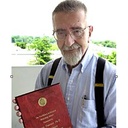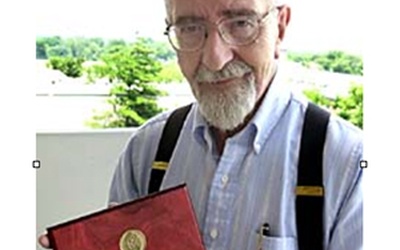
Roger Daniels
Roger Daniels, profesor emérito de Historia Charles Phelps Taft en la Universidad de Cincinnati, ahora vive en Bellevue, Washington. Comenzando con La política del prejuicio: el movimiento antijaponés en California y la lucha por la exclusión japonesa (1962), ha escrito ampliamente sobre la historia de los japoneses estadounidenses y la historia de la inmigración, incluido Prisioneros sin juicio: los japoneses estadounidenses en la Segunda Guerra Mundial ( 1993; edición en japonés, 1997; 2ª ed., 2004) y Guarding the Golden Door: American Immigration Policy and Immigrants since 1882 (2004). Espera completar un manuscrito “Los casos japoneses-estadounidenses: una historia social, 1942-2010”.
Actualizado en enero de 2008
Historias de Este Autor
Words Do Matter: A Note on Inappropriate Terminology and the Incarceration of the Japanese Americans – Part 5 of 5
6 de febrero de 2008 • Roger Daniels
Part 4 >> When one examines the postwar printed record, whether memoirs by former inmates and officials or accounts by scholars and others, the result is pretty much the same. The terminology used by the government—evacuation and relocation—prevails, plus, for almost all the Nikkei authors and some scholars, the ambiguous “camp.” Nothing better exemplifies the difference between expressed Nikkei attitudes just after the war and three to four decades later than successive editions of two outstanding Nisei memoirs. The first, …
Words Do Matter: A Note on Inappropriate Terminology and the Incarceration of the Japanese Americans - Part 4 of 5
5 de febrero de 2008 • Roger Daniels
Part 3 >> Even as the mass round-up of West Coast Nikkei began, with an isolated group on Bainbridge Island, a short ferry ride from Seattle, the government’s wordsmiths were inventing new language. A “Civilian Exclusion Order” dated March 24, 1942, signed by Gen. John L. DeWitt and ominously numbered “No. 1,” directed all “Japanese persons, both alien and nonalien” to report to the ferryboat landing on March 30 for “temporary residence in a reception center elsewhere,” bringing with them …
Words Do Matter: A Note on Inappropriate Terminology and the Incarceration of the Japanese Americans - Part 3 of 5
3 de febrero de 2008 • Roger Daniels
Part 2 >> In discussing language, perhaps the best place to start is with the three- and four-letter epithets that were all but universally used to describe persons of Japanese birth or descent. While it was common until very recently for most Americans to use ugly words to describe persons of color and others deemed to be “lesser breeds without the law”—nigger, kike, wop, spic, chink, greaser, etc.—none was more universally used than Jap or Japs. One cannot imagine, for …
Words Do Matter: A Note on Inappropriate Terminology and the Incarceration of the Japanese Americans - Part 2 of 5
2 de febrero de 2008 • Roger Daniels
Part 1 >> The Roosevelt administration never intended to intern any sizable percentage of those million alien enemies. Attorney General Francis Biddle, a civil libertarian of sorts, and his staff in the Department of Justice wanted a minimal program and were aware of the gross injustices suffered by German and Italian resident aliens in Winston Churchill’s Great Britain.11 In preparation for war, various federal security agencies, military and civilian, had prepared Custodial Detention Lists, better known as the “ABC Lists,” …
Words Do Matter: A Note on Inappropriate Terminology and the Incarceration of the Japanese Americans - Part 1 of 5
1 de febrero de 2008 • Roger Daniels
On or about August 2, 1979, I received a telephone call from Senator Daniel K. Inouye’s Washington office.1 One of his administrative assistants read me a draft of what became Senate Bill 1647 calling for the establishment of a “Commission on Wartime Relocation and Internment of Civilians (CWRIC).” The call came because I had been advising the staff of the Japanese American Citizens League and others about the campaign for redress. After hearing the draft I commented that it sounded …


